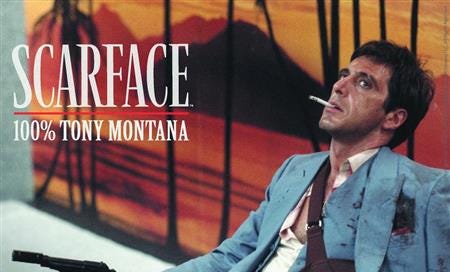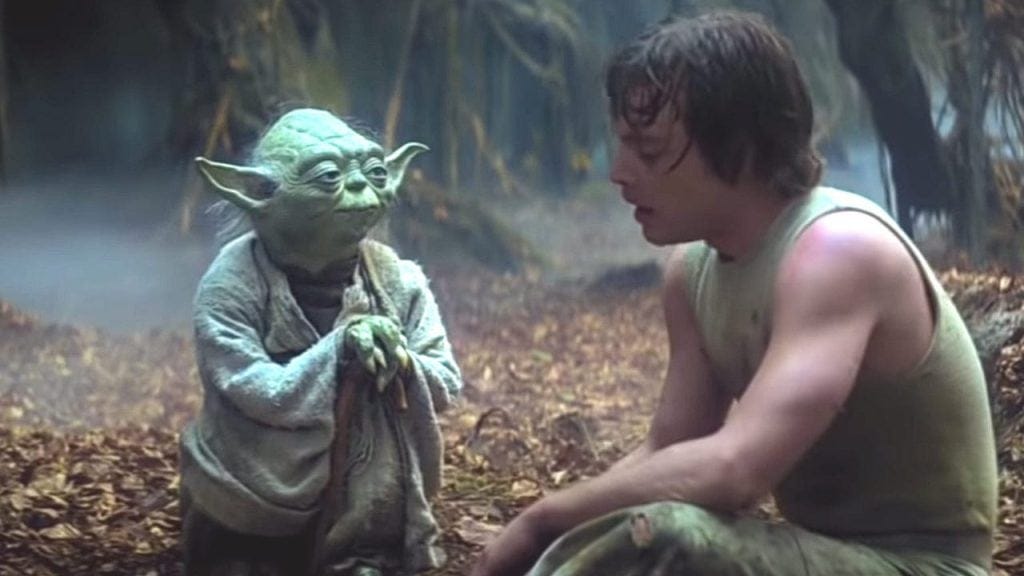How Accepting Scarface’s Tony Montana Can Give You JEDI Powers
A JEDI has control over their fears — not just their known fears. It goes beyond that into a place where Scarface lives... within your OWN psyche.
[Barry’s Preface] I’ve been fascinated for quite sometime about the unbridled, often hidden, fear that rules our lives. If you plan on dying one day (you do, right?), then you already know how facing that reality can unleash your present-potential in unimaginable ways.
So, when I read Nick Halaris’ poignant introspection below, I knew it was publish-here worthy. It’s not about just as simple as facing your known fears. It’s more about digging deep enough to know what’s really holding you back — from expressing, feeling and acting… as if… the final countdown doesn’t really matter in the first place.
Over to Nick, who has given me approval to publish his thoughts, for more on that…NOTE: The hyperlinks stripped in below are my own.
by Nick Halaris
The other day I was having a conversation with John, my great friend and longtime business partner. Our discussion ranged widely, as it usually does, and we ended up talking mostly about things like this [my] newsletter, raising kids, life and how to be better — Yeah, I know. Not very much business.
But interestingly, the more we talk about this, the better our company does! Anyway, at some point he brought up a fascinating question:
What would you do if you weren’t afraid?
Thinking about it now, this is one of the great questions of life. Fear is a pervasive psychological reality of the human condition. It’s something that we just have to contend with, and seems to have value beyond just its instinctual and evolutionary antecedents.
To be sure, fear is there to keep you alive, but it is also there to do so much more.
While there are many kinds of fear — too many to list here — there’s something really important about a certain kind of fear in life, a psychological fear.
I used to get excited and motivated by famous phrases like Alexander’s “conquer your fear, and you will conquer death!;” FDR’s “the only thing we have to fear is fear itself;” or Dune’s Litany Against Fear: “I must not fear. Fear is the mind-killer. Fear is the little death that brings total obliteration. I will face my fear. I will permit it to pass over me and through me. And when it has gone past, I will turn the inner eye to see its path. Where the fear has gone, there will be nothing. Only I will remain.”
What I’ve come to realize now that I’ve grown a bit older is that while there’s definitely something powerfully important about this kind of heroic courage — to overcome the fear of death in a key moment or time in life — it’s not exactly what the question above is about.
There is a fear that develops in your life that doesn’t have anything to do with survival or combat or extreme danger. Well, maybe it does in a way, but not directly. This fear is much more subtle and mostly operates subconsciously. It is the fear that prevents you from becoming who you want to become.
While I have no idea where this fear comes from or why, I am convinced that we are all intimately familiar with it. It might be our closest companion in life and its mere
existence explains a lot about us.
I want to talk about something kind of crazy to demonstrate the point.
Just why do so many people relate to a character like Scarface’s Tony Montana? How exactly does he become a sympathetic character? Clearly, he is a disaster of a human being — a drug dealer, a murderer, a drug addict, he even kills his best friend….
But we love him still because we all can relate to the arc of his story in an important way. When Tony is yelling at all the Miami socialites in a drunken tirade (“You don’t have the guts to be what you wanna’ be!”) we are nodding our heads and saying to ourselves inside, “that’s right!”
You see, we love Tony Montana because, twisted though he may be, he overcame this fear of becoming.
Many of the gurus of our self-help obsessed era are clued into this already. Tim Ferris, for instance, gave an interesting TED talk about how “fear setting” might be a
better approach to improving your life than “goal setting.”
His idea, a very good one, is to flip the usual process of self-improvement on its head and look inward for direction instead of outward. This is good, but I think there’s something missing or not explained in quite enough detail.
For not all fears are created equal!
The problem with fear is that anything you can imagine about life, you can imagine being afraid of as well. So how should we think about prioritizing these things? Which fears should we listen to, and which ones should we ignore? Which fears should we face head-on? Which fears should we seek to overcome?
You might learn something valuable about yourself by facing your fear of heights and going skydiving. Certainly, you’ll strengthen your self-confidence and enjoy the energy, exhilaration and quickening of the spirit that comes out of such things.
However, when all is said and done, will you be happier? Will you be a better person?
I’m guessing not.
For the advice about facing your fears to be valuable, you have to be willing and able to face a certain kind of fear.
It’s the fear that you almost don’t even know about. It’s the fear that Star Wars is all about. Remember that scene in Yoda’s hut? At this point in the story, Obi-Wan is dead and Luke is desperate to continue his training. He boldly declares, “I’m not afraid!”
Yoda pauses and smiles a bit, a smile that suggests he knows something Luke doesn’t know. “Gooood. You will be. You will be.”
You see, Luke is at the stage here where he doesn’t even know what he is afraid of. In our own lives, this is where we want to start looking carefully… if we want to use fear to help us become better.
It strikes me that it requires a great deal of emotional sophistication and self-knowledge to be effective here and, unfortunately, most of us don’t have a Jedi guru like Yoda to help us along the way.
By the way — a topic for another article, perhaps — what makes Star Wars such a compelling story is that it operates on both levels of this whole facing your fear dynamic. On the surface, it’s a story about the first kind of fear that I mentioned above, the kind that demands courage and heroism in the face of some external evil.
But it’s also, all the same, a story about what it means to face this other kind of fear. Luke’s triumph isn’t so much in defeating the Emperor, but in avoiding the fate of his father. In fact, it is only by avoiding that fate and coming to terms with his own inherent capacity for evil that he actually is able to defeat the Emperor.
Anyway. As you can tell, I’ve thought about Star Wars a lot, probably way too much.
Back to our discussion.
So our task is not as simple as just looking at what we are afraid of and facing it. We have to look deeper within ourselves… well below the surface level fears like claustrophobia or the fear of heights or the fear of pain.
We have to look until we find something much more personal, something related to our sense of self, like the fear of public speaking.
Now, there’s something worth really looking into. What makes the fear of public speaking different is that it is a fear that is clearly beyond anything related to your instinct. We’ve moved far beyond evolution and genetics now and are dealing with something much more subtle.
When you reckon with something like the fear of public speaking, you have to get into the “why” behind it, as painful as it may be. Why precisely are you afraid of public speaking?
What is it that you fear?
These kinds of internal examinations are tough, so much so that we would much rather just push the fear aside, pretend it doesn’t exist and hope it might just go away. In life, we end-up doing things to protect our delicate sense of self. We deliberately avoid the possibility for public speaking. We don’t pursue the dreams we need to pursue.
Our surrender to fear acts as a limiting force, and we become something less than what we are capable of becoming. This is a very serious psychological problem, perhaps the ultimate one, because by giving into this fear you deny yourself the opportunity for authentic expression.
This is the kind of fear that is absolutely worth facing. I’m convinced after wrestling with my own fears — things like the fear of conflict and the fear of not being worthy or good enough as a writer — that the thing to look out for is whether your fear is preventing some authentic expression of your being.
Is there something that you want to do but just won’t or feel like you cannot?
Do you feel like you are holding yourself back? Are you deliberately limiting yourself? If the answer is “yes” to any of these questions, then you know you’re dealing with a fear worth facing. It’s time to get serious about embarking on your own hero’s journey.
You’ve got to discover what you are holding back and why. You’ve got to find a way to move closer to who you really want to be. It’s definitely not going to be easy, but it will make your life better.
Back to me, Barry Goss, the Bear:
🎬 Action Plan:
Re-read Nick Halaris’ poignant commentary on F-E-A-AR above. ☝️ Bookmark this, re-read it again. Seriously. Often living the good life means being reminded, consistently, that you have to get dirty, do some tough inner work, and march (sometimes grudgingly) forward in the face of self-doubt and resistance. It’s about conquering the invisible force within that tries to snuff out that which we are giving birth to.
Follow Nick here… by subscribing to his newsletter PROFIT — it’s a superb monthly read. Free, too. Nick combines inspirational personal-development with commentary and action plans tied to marketing and investing. And who knows, he may even be a future contributor to our forthcoming Rogue Money Research premium offering (coming soon).





